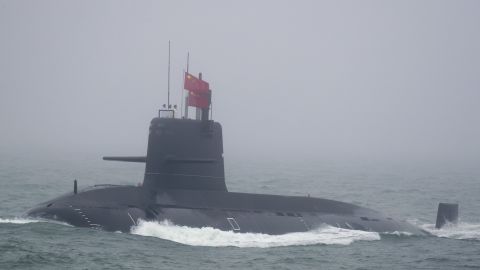Speaking at the National Press Club in Washington, DC, US Navy Secretary Carlos Del Toro said China “consistently attempts to violate the maritime sovereignty and economic well-being of other nations including our allies in the South China Sea and elsewhere.”
“They got a larger fleet now so they’re deploying that fleet globally,” he said, adding that Washington must upgrade the US fleet in response.
“We do need a larger Navy, we do need more ships in the future, more modern ships in the future, in particular that can meet that threat,” he said.
Meanwhile, the US fleet sits at under 300 ships.
According to the US Navy’s Navigation Plan 2022 released last summer, the Pentagon’s goal is to have 350 manned ships by 2045 – still well short of the projection for China’s fleet.
Before that target is met, however, the US fleet is expected to shrink as older vessels are retired, according to a November report from the US Congressional Budget Office.

Del Toro’s claims
Del Toro said Tuesday that US naval shipyards can’t match the output of Chinese ones. As with fleet size, it’s about numbers.
“They have 13 shipyards, in some cases their shipyard has more capacity – one shipyard has more capacity than all of our shipyards combined. That presents a real threat,” he claimed.
Del Toro did not give a breakdown of those shipyards, but Chinese and Western reports say China has six major and two smaller shipyards building naval vessels.
In the US, seven shipyards produce large and deep draft ships for the US Navy and Coast Guard, according to an October report from Brent Sadler at the Center for National Defense.
But no matter the number of shipyards, they need workers, and Del Toro says China has a numerical advantage there, largely because it is free of the restrictions, regulations and economic pressures that affect labor in the US. – CNN
One big US problem is finding skilled labor, he said.
“[W]hen you have unemployment at less than 4%, it makes it a real challenge whether you’re trying to find workers for a restaurant or you’re trying to find workers for a shipyard,” the Navy leader said.
He also said China can do things the US can’t.
“They’re a communist country, they don’t have rules by which they abide by,” he said.
“They use slave labor in building their ships, right – that’s not the way we should do business ever, but that’s what we’re up against so it does present a significant advantage,” he claimed.
CNN has reached out to China’s Foreign Ministry for reaction to Del Toro’s allegations.
US advantages
Del Toro did not supply specifics to support the slave labor allegation, and analysts expressed doubt that Beijing would resort to such a tactic.
“China has a very large pool of available manpower and it wouldn’t really make sense to use slave labor in a high-tech sector vital to their national security,” said Blake Herzinger, a nonresident fellow and Indo-Pacific defense policy expert at the American Enterprise Institute.
Herzinger said comments like that from the Navy chief are indicative of a pattern where US attention is put in the wrong place – to the detriment of US abilities.
“This seems unfortunately common, that Navy leadership throws stones at real or imagined faults in Chinese shipbuilding rather than reckoning with US failures over two decades to conceptualize, design and build ships for its own navy,” Herzinger said.
According to a US Congressional Research Service report from November, the US Navy has taken steps to address the gap with China, including assigning more of its fleet to the Pacific and using newer and more capable ships in Pacific roles.
And Del Toro said Tuesday that the US retains one big advantage over China – “our people.”
“In many ways our shipbuilders are better shipbuilders, that’s why we have a more modern, more capable, more lethal Navy than they do,” he said.
US military personnel are better on their feet, too, Del Toro contended.
“They script their people to fight, we actually train our people to think,” he said.
“There’s a fundamental difference in how we train our Marines and our sailors and our soldiers and our airmen and our Space Force in this country that gives us an inherent advantage over anything the Chinese can put up.” CNN
US urged to stop suppression of Chinese students

Students study at a library of Columbia University in New York, the United States, on December 7, 2019. File Photo: Xinhua
The Chinese Foreign Ministry on Wednesday expressed “grave concern” over US law enforcement authorities’ wanton harassment and bullying of Chinese students in the US, and it has lodged a strong démarche to the US side.
A Chinese student engaged in research on cancer in the US on a legal visa issued was refused entry and repatriated by the US in recent days, according to media reports.
People-to-people exchanges form the foundation for public support to China-US relations, of which academic, educational, scientific and technological exchanges are an important part, Wang Wenbin, Chinese Foreign Ministry spokesperson, said on Wednesday, adding that this seriously harms the lawful rights and interests of Chinese students in the US and undermines normal people-to-people exchanges and educational cooperation between the two countries.
For more than a decade, China has been the top source of international students to the US, providing universities with crucial tuition dollars to offset domestic declines and dwindling state funding at public universities.
In the 2019-20 academic year, before the pandemic depressed study-abroad numbers, Chinese nationals accounted for 35 percent of foreigners studying in the US and contributed $15.9 billion in economic value, according to numbers tracked and aggregated by the Institute of International Education’s Open Doors report.
However, the number of US student visas issued to Chinese nationals plunged by more than 50 percent in the first half of 2022 compared with pre-COVID-19 levels, with the US losing ground as the most-coveted place for Chinese students to pursue higher education abroad, reported The Wall Street Journal in August 2022.
“Even before the pandemic, Chinese students were shifting their study-abroad sights elsewhere, driven by doubts about whether they would feel welcome in the US and the emergence of more domestic and international alternatives. Travel restrictions and heightened safety concerns during the pandemic accelerated that decline,” said the report.
In May 2020, then US president Donald Trump issued Presidential Proclamation 10043, which banned Chinese postgraduate students and researchers from studying or working in the US if they had previously been affiliated with China’s “military-civil fusion strategy.”
Chinese students spotted by the US government have been mainly from eight Chinese leading science universities, which have always been US targets as they are believed to have links to the Chinese military. Students at these schools are accused of carrying out so-called the missions of espionage and illegal collection of intellectual property if they are allowed to study in the US.
Strict restrictions on those with high-tech backgrounds remain in place and such restrictions are extended to those applying for study in literature and business, leading over 1,000 Chinese students to decide to cast away their illusions and file suit.
The Chinese side urges the US to genuinely welcome Chinese students as it has said, and withdraw the biased and discriminatory Proclamation 10043, Wang stressed, noting that the US should stop abusing the concept of national security, and it should stop harassing and repatriating Chinese students in the US and avoid such incidents from happening again.
China will continue to support Chinese students in safeguarding their legitimate and lawful rights and interests in accordance with the law, and also remind them to be alert to relevant risks, Wang added.
“Chinese students in the US face multiple torments of gun violence and racial discrimination from local society, plus fear of being harassed and repatriated at any time by the US government,” a student surnamed Li, who studies biopharmacy at John Hopkins University in Baltimore, told the Global Times on Wednesday.
“I can’t imagine how a medical student could become a spy carrying the so-called mission of espionage and illegal collection of intellectual property accused by the US government,” Li said. “The only reason for us to come here is to learn more knowledge so that we can treat more patients in the future,” she added.
Another Chinese student affirmed that she had been censored by the US government as her mother used to work as a government officer. “I don’t know how my study of economics will pose a threat to the US government,” she said. “The experience of being vetted and refused visas has caused me a huge shadow and made me nervous every day here.” – GLOBAL TIMES
CNN / GLOBAL TIMES
.
